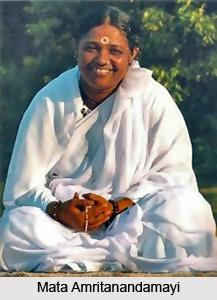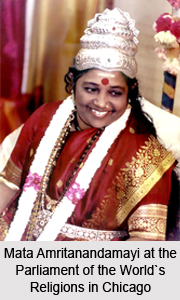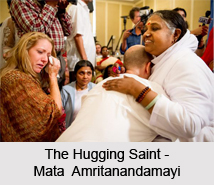 Mata Amritanandamayi, widely known as Amma, is an Indian Spiritual Leader of Hinduism. She is vastly respected for her humanitarian works and sometimes referred as a `hugging saint. Amritanandamayi Devi was born in a poor fishing village in Kerala, Southern India, in 1953. She was given the name Sudhamani (Ambrosial Jewel). At the age of six months she could walk and talk, and by the age of three she was constantly singing. By the age of five she was composing beautiful, extraordinarily profound hymns to her beloved Lord Krishna.
Mata Amritanandamayi, widely known as Amma, is an Indian Spiritual Leader of Hinduism. She is vastly respected for her humanitarian works and sometimes referred as a `hugging saint. Amritanandamayi Devi was born in a poor fishing village in Kerala, Southern India, in 1953. She was given the name Sudhamani (Ambrosial Jewel). At the age of six months she could walk and talk, and by the age of three she was constantly singing. By the age of five she was composing beautiful, extraordinarily profound hymns to her beloved Lord Krishna.
Early Life of Mata Amritanandamayi
Sudhamani ended her schooling when she was nine, and she began to take care of her younger siblings and the family domestic work full-time. The pain of others was unbearable to her because her empathy was such that. During Her early teens, Sudhamani was sent to the houses of relatives where she laboured for long hours, taking care of their households as well. Throughout all her duties She was incessantly singing and chanting Krishna`s name, and imagined that all the work she did was for him.
Social Reforms of Mata Amritanandamayi
Since 1981, Amritanandamayi Devi has been teaching spiritual aspirants all over the world. In 1993, she represents Hinduism at the Parliament of the World`s Religions in Chicago. Amritanandamayi was the keynote speaker at The Global Peace Initiative of Women Religious and Spiritual Leaders, at the UN in Geneva, Switzerland held in October 2002. This was an initiative of the UN` Millennium World Peace Summit, in which Amritanandamayi spoke in August 2000.
 She founded a worldwide organization, the Mata Amritanandamayi Math, which is engaged in many spiritual and charitable activities. From humble beginnings she undertook a journey to attain "universal motherhood". She addressed the United Nations General Assembly. Amma teaches renunciation, but only in the midst of a lifetime of refusing to consider her own comfort. Amma teaches Advaita. Amma is eternally established in Truth, which is beyond words, beyond thoughts. Many of Amritanandamayi`s followers believe in her powers to perform miracles. She is also considered by some to be an avatar of the Great Mother.
She founded a worldwide organization, the Mata Amritanandamayi Math, which is engaged in many spiritual and charitable activities. From humble beginnings she undertook a journey to attain "universal motherhood". She addressed the United Nations General Assembly. Amma teaches renunciation, but only in the midst of a lifetime of refusing to consider her own comfort. Amma teaches Advaita. Amma is eternally established in Truth, which is beyond words, beyond thoughts. Many of Amritanandamayi`s followers believe in her powers to perform miracles. She is also considered by some to be an avatar of the Great Mother.
The Mata Amritanandamayi Math is a public charitable trust that was founded to promote the message of Mata Amritanandamayi. The Mata Amritanandamayi Mission Trust is the parent organization for numerous spiritual, educational, social and cultural activities. Their activities include program to build 100,000 homes for the poor; hospitals; orphanages; hospices; women`s shelters; pension disbursements for widows; community aid centres; homes for the aged; eye clinics; and speech therapy centres. Many of Amma`s centres in the US run `Mother`s Kitchen`, or `vegetarian soup-kitchens`, where volunteers prepare and serve meals to the poor and needy. The Mata Amritanandamayi Math runs 33 schools, 12 temples, one super-speciality hospital in Kochi, feeds thousands during mass kitchen, provides pension every year to over 15,000 widows, builds 25,000 houses annually for the homeless and has 35 Amma welfare centres all over the world to spread her spiritual message. The Math`s relief work is happening in Kerala, Tamil Nadu, Puducherry, Andaman & Nicobar islands and in Sri Lanka.

Amritanandamayi`s main Ashram is Amritapuri Ashram. It is located in Parayakadavu, Kollam, Kerala. Amritapuri is also the name by which the location of the ashram is now known. Amritapuri is also one of the campuses of the Amrita Vishwa Vidyapeetham, the institute founded by Amma.
Personal life of Mata Amritanandemayi
Amritanandamayi Devi is known to the world media as `the hugging saint`. She offers hugs to everyone who approaches her. Amritanandamayi is said to have hugged at least 30 million people in the past 30 years, worldwide. Amritanandamayi Devi is an excellent singer. She has more then 100 recordings of Bhajans in more than 20 languages.
Awards and honours of Mata Amritanandamayi
1993, `President of the Hindu Faith`
1993, Hindu Renaissance Award
1998, Care & Share International Humanitarian of the Year Award
2002, Karma Yogi of the Year
2002, Gandhi-King Award
2005, Mahavir Mahatma Award
2005, Centenary Legendary Award of the International Rotarians
2006, James Parks Morton Interfaith Award
2006, the Philosopher Saint Sri Jnaneswara World Peace Prize
2007, Le Prix Cinma Vrit
2010, The State University of New York awarded Amma an honorary doctorate in humane letters on May 25, 2010




















